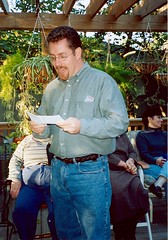People as Quantum Machines
This is a little choppy ... bear with me ...
Way back on December 21, 2005, Kathy Sierra from Creating Passionate Users talked about The Quantum Mechanics of Users ... it was all about waves and particles and how, by observing a user, we can actually change how he or she uses our services ... and not necessarily for the better. Her focus was on the difference between what people do and use versus how they describe what they do and use ...
She quotes Gladwell (from Blink) where he talked about the jam experiment ... the long-and-short being that when people were asked to choose the best jams their picks were in line with experts (add that to the list of my fantasy job titles ... Jam Expert), but when they were asked to say why they made the choices, suddenly their choices changed ... The simple act of asking changed the results ... but why?
As I found myself poring over the comments left on her post, I came across one from Dave Rogers (no relation) who talked about the idea of extra-experiential intellectualization, attributing it back to "God in the Dock" by CS Lewis. According to Dave, Lewis wrote that people didn’t/couldn’t intellectualize when they’re in the throes of something (passion, laughter, sorrow, etc.) ... instead, he says:
"Human intellect is incurably abstract... Yet the only realities we experience
are concrete--this pain, this pleasure, this dog, this man. While we are loving
the man, bearing the pain, enjoying the pleasure, we are not intellectually
apprehending Pleasure, Pain or Personality. ... This is our dilemma--either to
taste and not to know, or to know and not to taste--or, more strictly, to lack
one kind of knowledge because we are in an experience or to lack another kind
because we are outside it.”
On a more personal note, this totally ties in with something a friend of mine (not aware of my newly piqued interest in extra-experiential intellectualization and quantum mechanics) said to me earlier today. He was trying to "think" through an emotional conundrum ... saying "no matter how I look at the problem and the way it's making me feel, I can't seem to think through a solution that I like." In quantum terms ... his waves were willing, but his particles were weak. He was trying to use his particle (i.e., thinking/logical) mind to shape his wave-shaped emotions and was failing miserably. I guess the physicists among us would have expected it ...
In the end Kathy says:
“We have to get better at making inferences from what we observe without
intervention. We have to get to the spirit of what we observe, rather than
focusing on the specific details. We have to recognize that what they do says
much more than what they say, especially when they're not saying anything at
all.”
I’d add that we need also to remember our waves and particles ... that while we absolutely need to get better at inferring without changing peoples' behaviors, our true test will be to determine which part of our human quantum machine our patrons will be using as they both experience and intellectualize what we provide.


1 Comments:
This reminds me of the first two sentences one of my higher up Psych profs said on the first day of class: "First and foremost, Psychology is the study of the human mind. Secondly, we'll never know everything about the human mind."
It was always sort of humbling that knowing that no matter what you did, how you did it, or why you did it, someone that was a part of your study or research would completly blow your hypothisis out of the water because of their abstract thought processes...though processes you never would have known existed by simply talking to them.
Post a Comment
<< Home